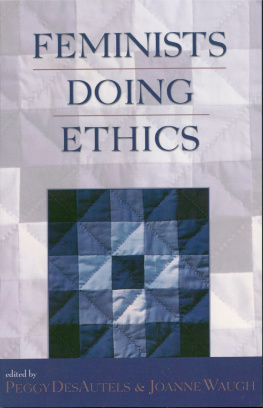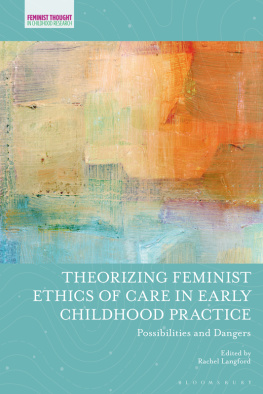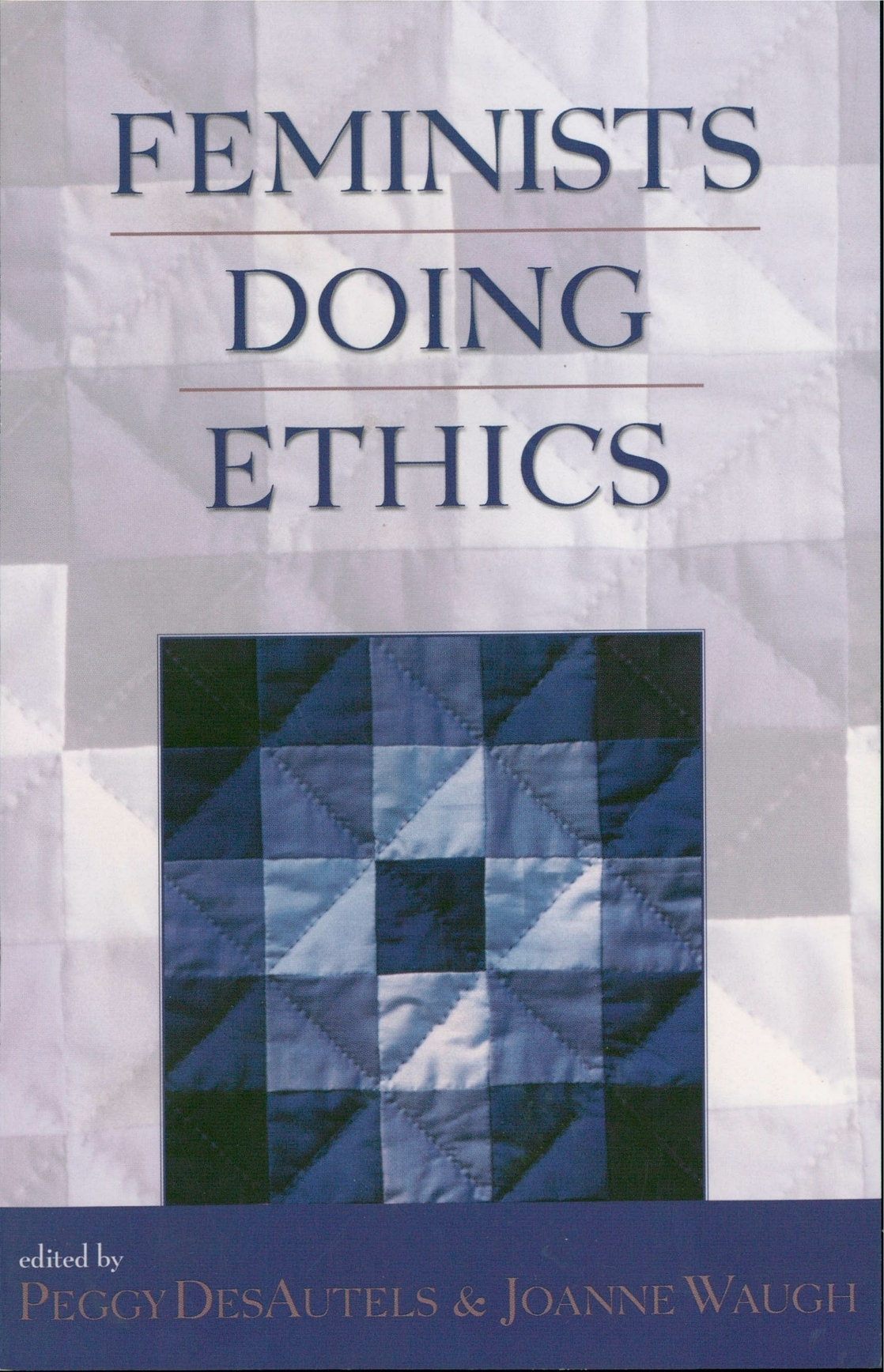There are many people who had a hand in bringing out this volume, and we hope, memory permitting, to acknowledge all of them. First we would like to thank Hilde Lindemann Nelson and Sara Ruddick for including this book in their Feminist Constructions Series at Rowman & Littlefield and for their enthusiasm and support in seeing the project to completion. We also wish to thank the contributors for their original and thoughtful essays, which continue the lively and timely discussion of recent advances in feminist ethics that began at the Feminist Ethics Revisited Conference in Florida in October 1999. This conference was sponsored by the Department of Philosophy and the Ethics Center at the University of South Florida (USF), and we are grateful to Peter French, who was chair of the Department of Philosophy and director of the Ethics Center when the conference was held. We are also grateful to David Schenck, current director of the USF Ethics Center, for supporting the publication of this volume. Kathy Agne, who served as office manager of the Ethics Center until September 2000, was indispensable both in organizing the conference that inspired this volume and in preparing the resulting manuscript for publication. We do not know how we would have managed without her or without the many USF graduate studentstoo many to namewho helped us in so many ways. A special thanks also goes to Eileen Kahl, who applied great skill and care in preparing the index of the volume. Last, we want to thank Robert Richardson and Butler Waugh for their help and support.
About the Contributors
Barbara S. Andrew is an assistant professor of philosophy at the University of Oregon. She has published articles in Philosophy Today and Hypatia and is currently working on a book on love and freedom in feminist ethics.
Alison Bailey is an associate professor at Illinois State University, where she teaches philosophy and womens studies. She is the author of Posterity and Strategic Policy: A Moral Assessment of U.S. Strategic Weapons Options (Unwin-Hyman, 1989) and several articles on feminist peace politics. Her current research explores moral questions addressing whether members of privileged groups have responsibilities to use privilege to dismantle complex systems of domination. Her work appears in Hypatia, The Journal of Social Philosophy, Whiteness: Feminist Philosophical Narratives, and Decentering the Center: Philosophy for a Multicultural, Postcolonial and Feminist World. Her current obsession is Iyengar-style yoga.
Bat-Ami Bar On teaches philosophy and womens studies at the State University of New York at Binghamton. Her primary theoretical and activist interests are in violence, though she escapes them (often?) by pursuing other themes. She is the editor of Daring to Be Good: Essays in Feminist Ethico-Politics with Ann Ferguson (Routledge, 1998), Women and Violence: A Special Issue of Hypatia (Fall 1996), Engendering Origins: Critical Feminist Readings of Plato and Aristotle, and Modern Engenderings: Critical Feminist Readings in the History of Modern Western Philosophy (both State University of New York, 1994).
Natalie Brender, an assistant professor of philosophy at Wesleyan University, writes and teaches in the areas of ethics, feminist philosophy, philosophy and literature, and political philosophy. Her current projects focus on Kantian moral agency and on problems of cosmopolitanism and international ethics.
Peggy DesAutels is an assistant professor of philosophy at the University of Dayton. She is the coauthor with Margaret Pabst Battin and Larry May of Praying for a Cure: When Medical and Religious Practices Conflict. She has published in such areas as feminist bioethics, moral psychology, and the philosophy of mind. She is currently writing a book on moral perception.
Margaret A. McLaren is an associate professor of philosophy at Rollins College in Winter Park, Florida, where she teaches philosophy and womens studies. She received her Ph.D. from Northwestern University in 1991. Her research interests are in feminist theory, contemporary Continental philosophy, social and political theory, and ethics. She has published articles on communitarian ethics, the social construction of gender, and feminism and Foucault. Currently she is working on a book entitled Foucault, Feminism and Embodied Subjectivity (State University of New York Press, in press).
Diana Tietjens Meyers is a professor of philosophy and womens studies at the University of Connecticut at Storrs. She is the author of Self, Society, and Personal Choice (Columbia University Press, 1989) and Subjection and Subjectivity: Psychoanalytic Feminism and Moral Philosophy (Routledge, 1994). Feminists Rethink the Self (Westview Press, 1997) and Feminist Social Thought: A Reader (Routledge, 1997) are her most recent edited collections. She is currently at work on a new monograph Gender in the Mirror: Imagery that Confounds Us (Oxford University Press, in press).
Uma Narayan is an associate professor of philosophy and the director of the Womens Studies Program at Vassar College. She is the author of Dislocating Cultures: Identities, Traditions and Third World Feminism (Routledge, 1997), which was awarded the American Political Science Associations 1998 Victoria Schuck Award for the best book on women and politics. She coedited Reconstructing Political Theory: Feminist Perspectives (Pennsylvania State University Press, 1997) with Mary Lyndon Shanley; Having and Raising Children: Unconventional Families, Hard Choices and the Social Good (Pennsylvania State University Press, 1999) with Julia Bartkowiak; and Decentering the Center: Philosophy for a Multicultural, Postcolonial and Feminist World (Indiana University Press, 2000) with Sandra Harding.
Hilde Lindemann Nelson is an associate professor in the Philosophy Department at Michigan State University. She is the coauthor, with James Lindemann Nelson, of The Patient in the Family (Routledge, 1995) and Alzheimers: Answers to Hard Questions for Families (Doubleday, 1996). She has edited two collections Feminism and Families and Stories and Their Limits: Narrative Approaches to Bioethics (both Routledge, 1997)and coedited Meaning and Medicine: A Reader in the Philosophy of Health Care (Routledge, 1999). Her articles in feminist ethics have appeared in Hypatia and a number of edited collections. She coedits the Reflective Bioethics Series for Routledge and the Feminist Constructions Series for Rowman & Littlefield. Her most recent book is Injured Identities, Narrative Repair (Cornell University Press, 2001).
James Lindemann Nelson is a professor of philosophy at Michigan State University, where he teaches and writes on topics in bioethics and moral theory. He has coauthored two books and coedited an anthology; essays on feminist themes have appeared in Hypatia, The Kennedy Institute of Ethics journal, The Hastings Center Report, and Theoretical Medicine, as well as in several collections, including Feminism and Bioethics: Beyond Reproduction, edited by Susan Wolf, and Mother Time: Women, Aging and Ethics, edited by Margaret Walker (Rowman & Littlefield, 1999).
Nancy Potter received her Ph.D. in philosophy and feminist studies from the University of Minnesota and is now an assistant professor at the University of Louisville. Her primary interests are in ethics and social and political philosophy, including philosophies of peace. Her latest research concerns the philosophical implications of teaching empathy to sex offenders in the state prison system. She is also writing a book on trustworthiness as a virtue.





